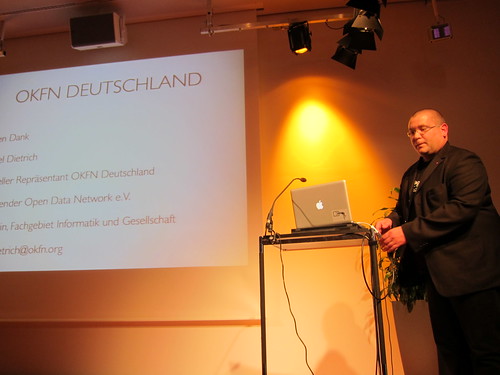We are delighted to announce the launch of the Open Knowledge Foundation Germany, which took place yesterday at the Leipzig Semantic Web Day.

The OKF Germany chapter will be dedicated to promoting all forms of open knowledge in Germany — including open government data, open data in science, and the public domain.
Work is already underway create a citizen driven registry of open data (with a particular focus on government information) which can be seen at:
OKF Germany has attracted a distinguished board of academics, technologists, journalists, librarians, scientists and policy experts. These include:
- Prof.em. Dr. Dr. Eberhard R. Hilf, retired Professor of Theoretical Physics and CEO of the Institute for Science Networking Oldenburg GmbH at Carl von Ossietzky Universitaet, Oldenburg
- A prominent advocate of open access to scientific research in Germany and editor of the Access to Information blog (mostly in German).
- Prof.em. Dr. Bernd Lutterbeck, TU Technical University Berlin, Informatics und Society, Berlin
- Dr. Lutterbeck has been a keyplayer and advocate for privacy and data-protection and invented the German right of “Informational self-determination” in the early 1980s. He has also written widely about open source, open access and open educational resources and is publisher of the Open Source Yearbook.
- Prof. Dr. Rainer Kuhlen, Informatics University Constanze, German Chair for Communications of the UNESCO (ORBICOM)
- Prof. Kuhlen has been a key player in German civic society activities around the
Charter of Civil Rights for a Sustainable Knowledge Society at the UNESCOs WISIS. He has numerous publications on information society and open access and has engaged for a sustainable model for scientific publications as co-founder and spokesperson for the Coalition for Action “Copyright for Education and Research”.
- Prof. Kuhlen has been a key player in German civic society activities around the
- Prof. Dr. Jörn von Lucke, Department of Administration and Management at Deutsche Telekom Institute for Connected Cities (TICC).
- Prof. von Lucke’s research focuses on e-Government strategies – in particular how government can promote transparency, participation and collaboration. He leads the Electronic Government and Applications working group at the Fraunhofer FOKUS Institute.
- Prof. Dr. Christian Bizer, Department of Economics at Free University of Berlin
- Prof. Dr. Bizer is heavily involved in the Linked Open Data community and is a founder of the DBpedia project.
- Dr. Sören Auer, Universität Leipzig
- Dr. Auer is a member of the OKF Advisory Board, organiser of the Leipzig Semantic Web Day and a founder of DBpedia, Cofundos and Open Research.
In addition to the launch of the OKF chapter there were plenty of interesting discussions about the state of open knowledge in Germany. Some key highlights:
- A keynote from Prof Rainer Kuhlen, talking about the “bigger picture” of information society, the right of access to information and the issues with restrictive copyright licensing and the artificial scarcity of “immaterial goods”.
- A talk from Prof Jörn von Lucke, talking about the potential innovation that can be brought about by open government data and greater transparency and participation.
- A talk from Jonathan Gray on the Open Knowledge Foundation, open government data in the UK, and the future of open data.
- Matthias Spielkamp talking about the importance of free licenses for sustainable open data strategies.
- Daniel Kinzler talking about structured data in the Wikipedia project, with a sneak preview of how Wikipedia will look in about one year (exciting!)
- A panel discussion on the state of open government data in Germany with representatives form public sector, the scientific community, the private sector and civil society. This discussion highlighted the obstacles and opportunities in German politics to help government and public sector to become more open and transparent and what initiatives and prototypes can be developed to underline the value of the reuse of public sector information.
This is fantastic news and we look forward to following the activities of the new chapter — and doing everything we can to support it! If you’re interested in getting involved, please say hello on the mailing list.
For further information see:
- The Open Knowledge Foundation Deutschland website
- The Open Data Network website
- The Leipzig Semantic Web Day 2010
- The okfn-de mailing list









Congratulations to all (and Daniel especially — nice picture btw!).
It’s wonderful to have our first official country chapter formally launched and here’s to open knowledge development auf deutsch :)
PS: for those who want an announce in German see here: http://okfn.de/okf/okfn-deutschland-gegruendet/